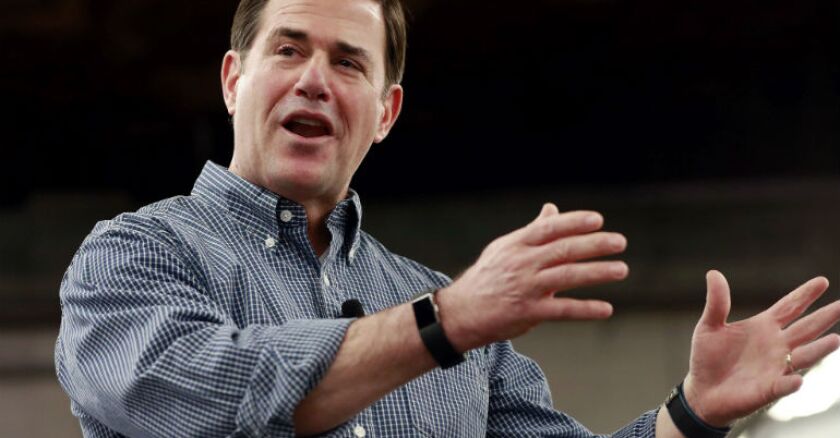Arizona's Republican governor is seeking a second term this November, and polls show him in a tossup race or even trailing his potential opponents. One poll conducted in June suggested that only a quarter of Arizona voters believe he deserves reelection.
"All incumbent races ultimately come down to whether voters want to fire the incumbent, and voters are showing a pretty strong inclination to do that," says Democratic consultant Andy Barr.
Ducey's Democratic opponent will be selected by voters during next Tuesday's primary. It will most likely be David Garcia, an education professor at Arizona State University, or state Sen. Steve Farley.
Arizona is one of the states that joined the wave of teacher strikes and protests this spring. Given its bottom-scraping rankings in school performance and teacher pay, Arizona Democrats see education as Ducey's greatest vulnerability.
In response to the protests, he signed legislation that promises to increase teacher salaries by 20 percent over three years, including a bump for the school year just getting underway.
"Our education system is getting an infusion of cash probably like it's never seen before," says Glenn Hamer, president of the Arizona Chamber of Commerce and Industry. "Right now, teachers are seeing a 10 percent increase in their paycheck."
Still, Democrats argue that Ducey's response was inadequate, questioning how he intends to pay for continued increases.
"He's gotten criticized by local press who are calling it an election-year tactic," says Les Braswell, communications director for the Arizona Democratic Party. "There's no pay-for for it. It's very clearly a mechanism just to get him through to November."
Both Garcia and Farley support a ballot measure that would increase taxes on the wealthy to fund schools. Ducey is opposed, declaring simply in May, "Well, I don't support tax increases."
Republicans are convinced that either of Ducey's challengers will be deemed too liberal by general election voters in a state long dominated by their party.
"All the fundamentals in this race lean strongly toward Gov. Ducey," says Republican strategist Matthew Benson. "Whichever Democrat comes out of the primary, they are literally going to have to run the table among independents in this state, and I haven't seen any evidence for that."
Benson and other Republicans note that Garcia is running a typical hard-left 2018 Democratic campaign, promising free college tuition and calling for the abolishment of U.S. Immigration and Customs Enforcement (ICE).
"You have a candidate who is well-positioned for the Democratic primary electorate and horribly out of sync with the general election electorate," says Benson, who worked as a spokesman for former GOP Gov. Jan Brewer.
But Arizona Republicans face unusual headwinds this year. As in other states, Arizona Democrats believe their voters are energized this year by disdain for President Trump. In April, Republicans won a special congressional election in suburban Phoenix by just 5 points, in a district that Trump had carried by 21 points in 2016.
"If we can replicate that statewide," says Braswell, "we're going to have a very good night come November."
Polls indicate that Democratic Congresswoman Kyrsten Sinema is the favorite in the race to succeed retiring Republican U.S. Sen. Jeff Flake, although her lead has been narrowing. Sinema has positioned herself as a moderate, spending a good deal of her time courting the business community and avoiding discussion of social issues. To the extent she talks about immigration, it's to underscore the importance of public safety.
Moderate-to-conservative Democrats have been the most successful in recent Arizona history. Even some Democrats are nervous that Garcia has positioned himself too far to the left to prevail against Ducey.
"One Democrat" -- Sinema -- "is running as a Bill Clinton centrist," says Hamer, the chamber president, "and another" -- Garcia -- "is running as Bernie Sanders, Jr."
Farley has been considered the underdog throughout the primary season, although he's raised more money than Garcia. He has sought to avoid positions that would place him on the far left of the spectrum.
"Going around the state, I'm not hearing people say 'go to the left as far as you can,'" Farley told National Journal.
In a sign of Ducey's potential vulnerability, the Republican Governors Association has reserved more than $8 million in airtime to defend him this fall. But that's also a sign that Ducey and his allies will be able to out-raise his Democratic opponent. And Republicans have a 15-percentage-point registration advantage over Democrats in the state.
"The economy is the healthiest it's ever been," Hamer says. "We have more jobs open than people to fill them."
Polls taken at this point four years ago also indicated that Ducey could lose. He ended up winning by a 12-point margin. Conditions are less favorable for him and other Republicans than they were in 2014, but Ducey will come out of next week's primary as the early if not overwhelming favorite.
"Every four years about this time, we have polls that come out and Democrats get really excited because it looks like the Republican candidate for statewide office is in trouble," says Benson. "Every election is different, but I would look for a similar dynamic to play out as Republicans come home."
This appears in the Politics newsletter. Subscribe for free.









